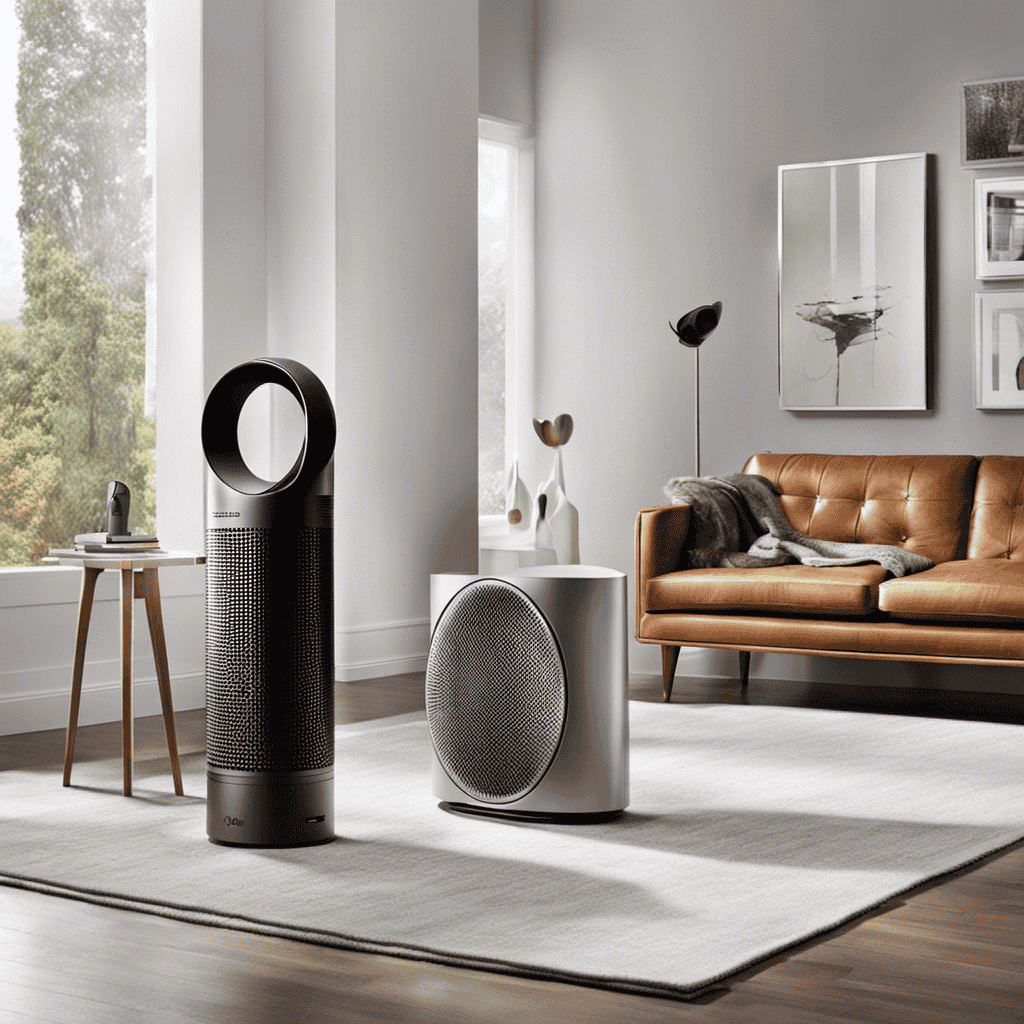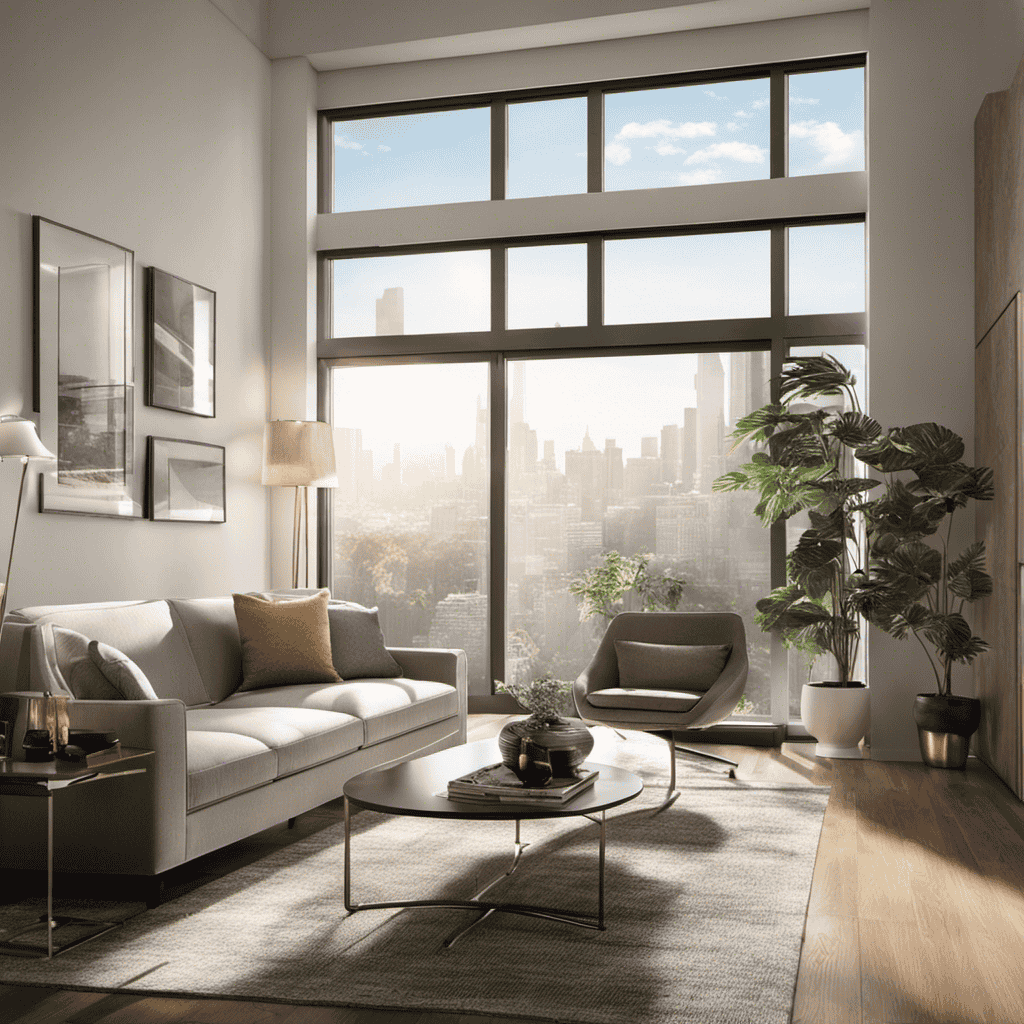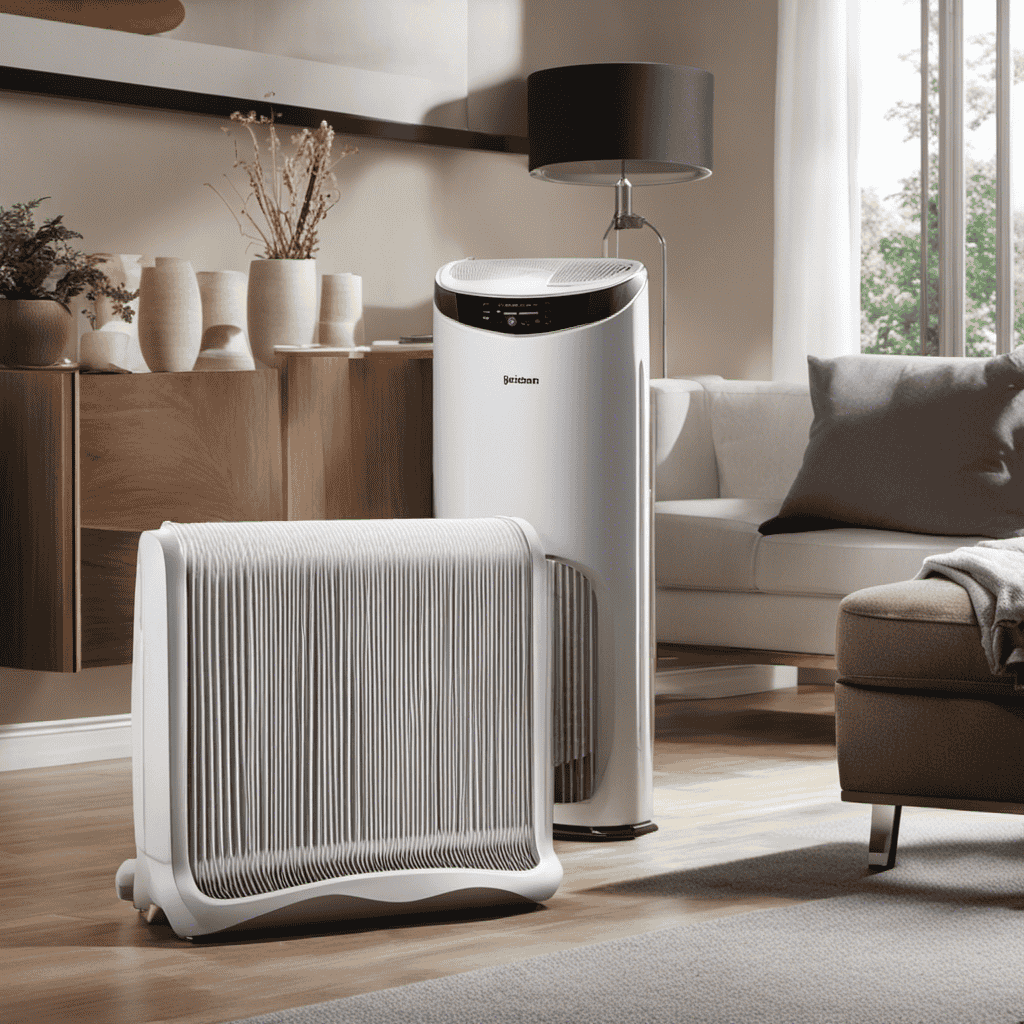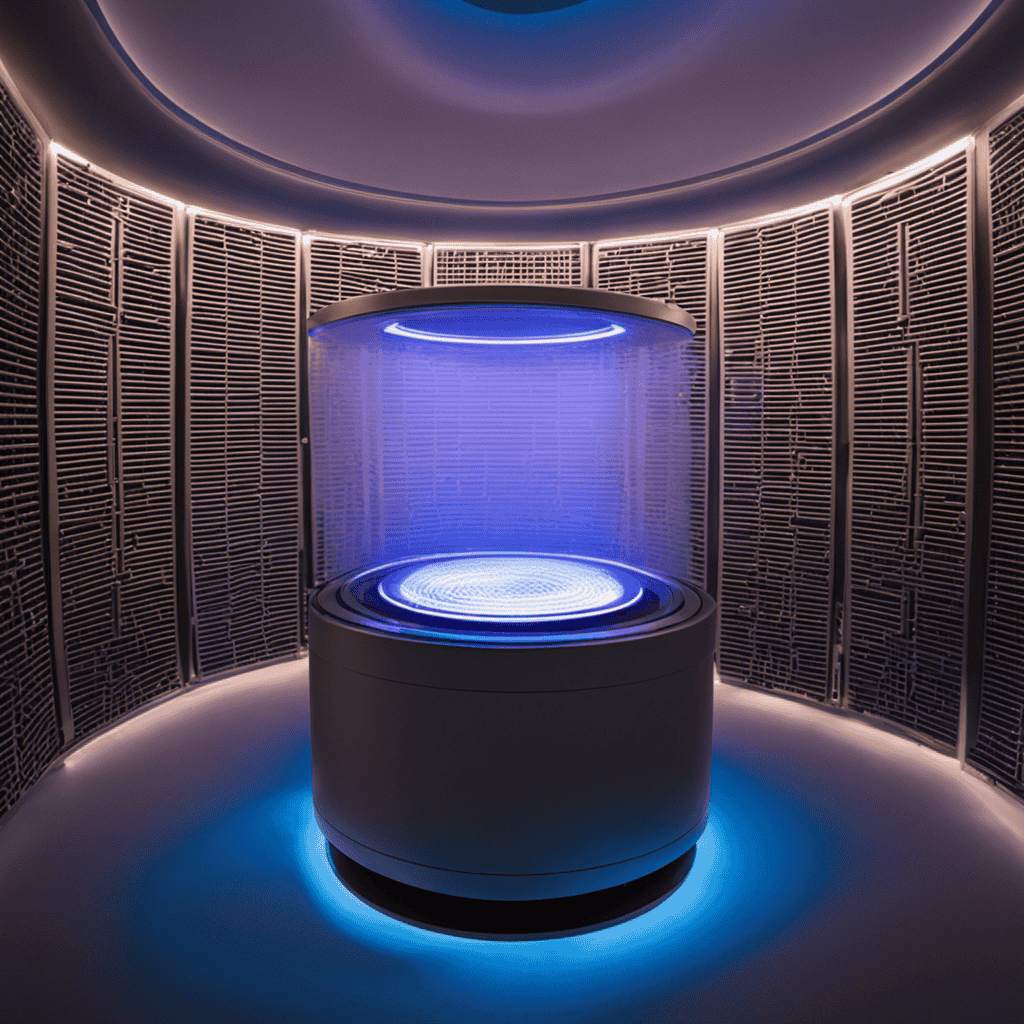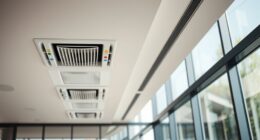Picking the perfect Dyson air purifier may seem overwhelming, but do not worry! I am here to assist you in navigating through the selection process.
With a wide range of options available, it’s important to consider factors like room size, filter type, noise level, and energy efficiency.
In this article, we’ll explore the various Dyson air purifiers on the market and highlight key features to assist you in making an informed decision.
So, sit back, relax, and let’s clear the air on which Dyson air purifier is the perfect fit for you.
Key Takeaways
- Dyson offers different types of air purifiers with HEPA filters and activated carbon filters.
- Consider your budget and specific needs, such as allergies or odors, when choosing a Dyson air purifier.
- Look for features like effective filtration systems and smart sensor technology to enhance the effectiveness and convenience of the purifier.
- Consider the size of the room and the air purifier’s capacity to ensure optimal air purification for larger spaces.
Types of Dyson Air Purifiers
If you’re looking for a Dyson air purifier, you should know that there are different types available. Dyson offers a range of air purifiers that cater to different needs and preferences.
One important aspect to consider when choosing a Dyson air purifier is the type of filter it uses. Dyson offers two main types of filters: HEPA filters and activated carbon filters.
HEPA filters are highly effective in removing particles as small as 0.3 microns, including allergens and pollutants. Activated carbon filters, on the other hand, are great at absorbing odors and harmful gases.
The benefits of air purification are numerous. It can help improve indoor air quality, reduce allergies and asthma symptoms, and create a healthier living environment.
Choosing the right type of Dyson air purifier with the appropriate filter can greatly enhance the air purification process and improve your overall well-being.
Considerations for Choosing a Dyson Air Purifier
When choosing a Dyson air purifier, there are several factors to consider.
First and foremost, it’s important to determine your budget before making a decision. The price range of Dyson air purifiers can vary greatly, so knowing your budget will help you narrow down your options.
If you suffer from allergies, finding the best Dyson air purifier for allergies is crucial. Dyson offers models with HEPA filters that are designed to capture allergens and improve air quality. These filters are highly effective at removing pollen, dust mites, and other common allergens from the air.
In addition to HEPA filters, some Dyson models come with activated carbon filters. These filters are designed to remove odors and pollutants, making them a great option for those who want to improve the overall air quality in their home.
Considering these factors will help you find the perfect Dyson air purifier for your needs. Now, let’s explore the key features to look for in a Dyson air purifier.
Dyson Air Purifier Features to Look for
When it comes to choosing a Dyson air purifier, two key features to consider are effective filtration systems and smart sensor technology.
Effective filtration systems are essential for removing pollutants and allergens from the air, ensuring a cleaner and healthier environment.
Smart sensor technology, on the other hand, allows the air purifier to automatically detect and respond to changes in air quality, providing real-time feedback and adjusting its performance accordingly.
These features can greatly enhance the overall effectiveness and convenience of a Dyson air purifier.
Effective Filtration Systems
To effectively filter out pollutants, you should consider the Dyson air purifiers with HEPA filters. These purifiers are equipped with advanced filtration systems that can capture even the smallest particles, including allergens, bacteria, and viruses.
When it comes to optimizing the air quality in your room, placement of the air purifier plays a crucial role. Here are some air purifier placement strategies to consider:
- Place the air purifier in the center of the room to ensure maximum coverage.
- Avoid placing the purifier near walls or furniture that can obstruct airflow.
- Consider the size of the room when choosing the appropriate purifier model.
- Place the purifier at a higher elevation to allow better air circulation.
Smart Sensor Technology
One of the advantages of smart sensor technology is that it automatically adjusts the air purifier settings based on the current air quality. This feature greatly enhances the user experience by ensuring that the air purifier is always working at the optimal level.
Smart sensors are able to detect pollutants and allergens in the air, such as dust, pollen, and pet dander. By continuously monitoring the air quality, the air purifier can adjust its fan speed and filtration settings accordingly. This means that the air purifier will work harder when the air quality is poor and reduce its intensity when the air is cleaner.
The benefits of smart sensors include improved air purification efficiency and energy savings. By only running at the necessary level, the air purifier consumes less electricity, resulting in lower energy costs. Moreover, the automatic adjustment of settings also prolongs the lifespan of the air purifier filters, reducing the need for frequent replacements.
As we move on to discussing room size and air purifier capacity, it’s important to consider how smart sensor technology can further enhance the overall performance of the device.
Room Size and Air Purifier Capacity
The best Dyson air purifier for larger rooms is the one with a higher capacity. When it comes to air purifiers, size does matter. The larger the room, the more air the purifier needs to clean effectively. A higher capacity means the purifier can circulate and filter more air, ensuring that every corner of the room receives clean and fresh air.
A larger room requires a purifier with a higher capacity for optimal air purification. It ensures that the purifier can effectively clean the air in every corner of the room. It provides a higher air flow rate, allowing for faster and more efficient air purification.
Clean air is essential for our health and well-being. Air purifiers play a crucial role in maintaining a clean indoor environment by removing pollutants, allergens, and harmful particles from the air. Breathing clean air is vital for our respiratory system and can improve overall health.
Investing in a Dyson air purifier with a higher capacity for larger rooms ensures that you and your family can enjoy the benefits of clean air throughout your home.
Dyson Air Purifiers With HEPA Filters
Investing in a Dyson air purifier with HEPA filters ensures cleaner and healthier air in your home. HEPA stands for High-Efficiency Particulate Air, and these filters are designed to capture 99.97% of particles as small as 0.3 microns.
The benefits of using a Dyson air purifier with HEPA filters are numerous. Firstly, it helps to remove common allergens such as dust mites, pollen, and pet dander, providing relief for those with allergies or asthma. Additionally, HEPA filters can also trap harmful pollutants like smoke, mold spores, and volatile organic compounds (VOCs), improving the overall air quality.
Dyson air purifiers with HEPA filters are not only effective but also easy to use and maintain. Regularly replacing the filters ensures optimal performance, allowing you to enjoy the advantages of cleaner and healthier air in your home.
Dyson Air Purifiers With Smart Technology
When it comes to Dyson air purifiers, the ones with smart technology are worth considering. These purifiers not only clean the air but also offer seamless integration with your smart home devices. With smart home integration, you can control and monitor your air purifier using voice commands or through an app on your smartphone. This adds convenience to your daily life as you can easily adjust settings or check air quality levels from anywhere in your home.
Here are two key benefits of Dyson air purifiers with smart technology:
-
Effortless Control: You can use voice commands with virtual assistants like Amazon Alexa or Google Assistant to control your air purifier. This means you can simply say ‘Hey Google, turn on the air purifier’ and it will start purifying the air.
-
Air Quality Monitoring: These smart purifiers continuously monitor the air quality in your home and provide real-time updates on pollutants and allergens present. You can easily check the air quality through the app on your smartphone, ensuring you and your family breathe clean and healthy air.
Overall, Dyson air purifiers with smart technology offer convenience and advanced features that enhance your indoor air quality monitoring and control.
Noise Level of Dyson Air Purifiers
When it comes to air purifiers, one of the key factors that many people consider is the noise level. Silent air purifiers have gained popularity in recent years as they provide effective purification without the disruptive noise.
Many brands, including Dyson, have incorporated noise reduction technology to ensure a quieter user experience. Understanding the user’s experience with noise is crucial in choosing the right air purifier that not only cleans the air but also maintains a peaceful environment.
Silent Air Purifiers
If you want a quiet air purifier, consider the Dyson model. The Dyson air purifiers are known for their silent operation, providing a peaceful environment while efficiently cleaning the air.
Here are some benefits of having a silent air purifier:
- Improved Sleep: The low noise level ensures a peaceful sleep, allowing you to wake up refreshed and rejuvenated.
- Enhanced Concentration: With minimal background noise, you can focus better on your work or studies, increasing productivity.
To achieve such silent operation, Dyson incorporates advanced noise reduction techniques in their air purifiers. These techniques include:
- Acoustic Engineering: Dyson engineers design the purifiers to minimize noise by optimizing airflow paths and reducing turbulence.
- Sound Insulation: The purifiers are equipped with innovative insulation materials that absorb and block sound, preventing it from escaping.
With these noise reduction technologies, Dyson air purifiers offer a quiet and serene atmosphere, allowing you to enjoy the benefits of clean air without any disturbance.
Now, let’s explore the noise reduction technology used by Dyson in detail.
Noise Reduction Technology
To reduce noise levels, engineers optimize airflow paths and incorporate sound-insulating materials in these air purifiers. Silent air purifiers are designed to provide a quiet and peaceful environment while effectively removing pollutants from the air.
The user experience with noise is an important consideration when choosing an air purifier, as excessive noise can be disruptive and irritating. By carefully engineering the airflow paths, manufacturers are able to minimize turbulence and reduce noise created by the movement of air through the purifier. Additionally, sound-insulating materials are used to absorb and dampen any remaining noise.
This ensures that the air purifier operates silently, allowing users to enjoy clean air without any disturbance. When selecting a silent air purifier, it is important to consider the noise reduction technology employed to ensure a pleasant user experience.
User Experience With Noise?
The quiet operation of silent air purifiers enhances the user experience by reducing disruptive and irritating noise levels. With features like silent mode and fan speed adjustments, Dyson air purifiers provide a customizable experience to suit individual preferences.
The silent mode enables the purifier to operate at its lowest noise level, allowing users to enjoy a peaceful environment without any disturbance. Additionally, the fan speed adjustments allow users to control the intensity of the airflow, resulting in a quieter operation when desired.
These features not only enhance the overall user experience but also ensure a comfortable and tranquil atmosphere in any room.
Transitioning to the subsequent section about the energy efficiency of Dyson air purifiers, their noise reduction technology is just one of the many benefits they offer.
Energy Efficiency of Dyson Air Purifiers
Dyson air purifiers are known for their energy efficiency. These devices are designed to consume minimal energy while effectively purifying the air in your home. With their advanced technology and innovative features, Dyson air purifiers ensure that you can breathe clean air without worrying about excessive energy consumption or environmental impact.
To illustrate the energy efficiency of Dyson air purifiers, here is a comparison table showcasing the energy consumption and environmental impact of different models:
| Model | Energy Consumption (Watts) | Environmental Impact |
|---|---|---|
| Model A | 30 | Low |
| Model B | 25 | Low |
| Model C | 20 | Very Low |
| Model D | 15 | Very Low |
As you can see, all Dyson air purifier models have low energy consumption, with some models even having a very low environmental impact. This means that you can enjoy clean air while being mindful of energy conservation and reducing your carbon footprint.
Maintenance and Filter Replacement for Dyson Air Purifiers
When it comes to maintaining and replacing the filters in Dyson air purifiers, there are a few key points to keep in mind.
First, proper filter care is essential to ensure optimal performance and longevity of the purifier.
Second, understanding the frequency of filter replacement is crucial to maintaining clean and healthy air in your home.
Proper Filter Care
Proper filter care is essential for maintaining the longevity and efficiency of your Dyson air purifier. By following these tips, you can ensure that your filters are properly maintained and their lifespan is extended:
- Regularly clean the pre-filter by gently vacuuming or washing it to remove dust and debris.
- Replace the HEPA filter as recommended by Dyson to ensure optimal filtration performance.
Neglecting proper filter maintenance can lead to reduced air purification effectiveness and increased strain on the purifier’s motor. It’s important to keep in mind that the filter lifespan will vary depending on usage and environmental factors, such as air quality and pollution levels. Regularly checking the filter indicator on your Dyson air purifier will help you determine when it’s time for a replacement.
Transitioning into the next section about the frequency of filter replacement, understanding the recommended replacement intervals will further optimize the performance of your Dyson air purifier.
Frequency of Replacement
After learning about proper filter care, let’s now discuss the frequency of replacement for Dyson air purifiers.
One important consideration when it comes to replacing filters is the cost. Dyson replacement filters can vary in price depending on the model and type of filter required. It’s essential to factor in this cost when deciding which Dyson air purifier to buy.
Additionally, user satisfaction with filter lifespan is another crucial aspect to consider. Dyson air purifiers are known for their durable filters that can last for up to a year with regular use. However, some users may find that the lifespan of the filter varies depending on their individual needs and the air quality of their environment.
Taking into account the cost of replacement filters and user satisfaction with filter lifespan can help you make an informed decision when choosing the right Dyson air purifier for you.
Cost of Replacement Filters
The cost of replacing filters for Dyson air purifiers can vary depending on the model and type of filter required, so it’s important to factor this into your decision. The initial investment in a Dyson air purifier may be higher compared to other brands, but the longevity of the filters can offset this cost in the long run.
Here are some key points to consider:
-
Dyson offers a range of air purifier models, each with different filter requirements. Ensure you understand the type and cost of replacement filters before making a purchase.
-
While the cost of replacement filters may seem high initially, Dyson filters are designed to last up to 12 months, depending on usage and air quality.
-
Investing in high-quality filters can improve the overall performance and efficiency of your air purifier, leading to cleaner air and potentially reducing health-related issues.
Considering the cost of replacement filters and their longevity is crucial to make an informed decision about which Dyson air purifier to buy.
Now, let’s delve into the next section about customer reviews and ratings of Dyson air purifiers.
Customer Reviews and Ratings of Dyson Air Purifiers
I’ve heard that customers really love the performance of Dyson air purifiers. When it comes to Dyson air purifier performance, they are known for their ability to effectively remove pollutants and allergens from the air. They use advanced filtration technology to capture even the tiniest particles, providing clean and fresh air for your home.
In terms of long-term durability, Dyson air purifiers are built to last. They are made with high-quality materials and undergo rigorous testing to ensure their reliability. Many customers have praised the durability of Dyson air purifiers, stating that they have been using them for years without any issues.
Frequently Asked Questions
Can a Dyson Air Purifier Eliminate All Types of Air Pollutants?
Yes, a Dyson air purifier can eliminate all types of air pollutants. Its advanced features, like HEPA filters and activated carbon filters, ensure that it captures and removes allergens, pollutants, and odors, providing cleaner and healthier air.
How Long Does a Dyson Air Purifier Typically Last Before Needing to Be Replaced?
Typically, a Dyson air purifier lasts for several years before needing replacement. It’s definitely worth the investment, especially considering the health benefits. Proper maintenance, like regular filter changes, can extend its lifespan. Dyson air purifiers also come with a warranty. Look out for signs like decreased performance or unusual noises to know when it’s time for a replacement.
Can I Use a Dyson Air Purifier in a Large Open Space or Only in a Single Room?
I can use a Dyson air purifier in a large open space or a single room. It has the benefits of purifying the air and removing pollutants, making it suitable for commercial spaces.
Do Dyson Air Purifiers Produce Any Ozone or Harmful Byproducts?
Dyson air purifiers do not produce ozone or harmful byproducts. They are designed to efficiently remove pollutants from the air without releasing any additional harmful substances, ensuring clean and safe indoor air quality.
Are Dyson Air Purifiers Effective in Reducing Pet Dander and Allergens?
Dyson air purifiers effectively reduce pet dander and allergens. Compared to other brands, they offer superior performance. When comparing different types of air purifiers, Dyson stands out for its technology and ability to capture microscopic particles.
Conclusion
After careful research and consideration, I’ve finally found the perfect Dyson air purifier for my needs.
It’s like a breath of fresh air in my home, literally! With its powerful HEPA filter, it effortlessly captures even the tiniest particles, ensuring clean and pure air.
Plus, its energy efficiency is a game-changer, saving me both money and the environment.
The maintenance is a breeze, and the glowing customer reviews reassured me of its effectiveness.
Now, I can confidently say that I’ve made the best choice for my indoor air quality.
